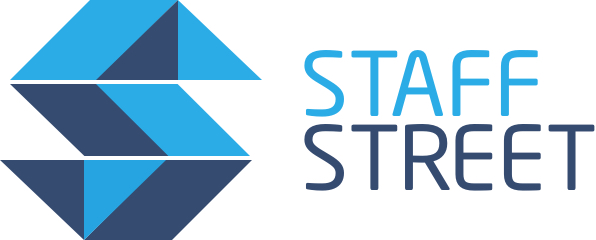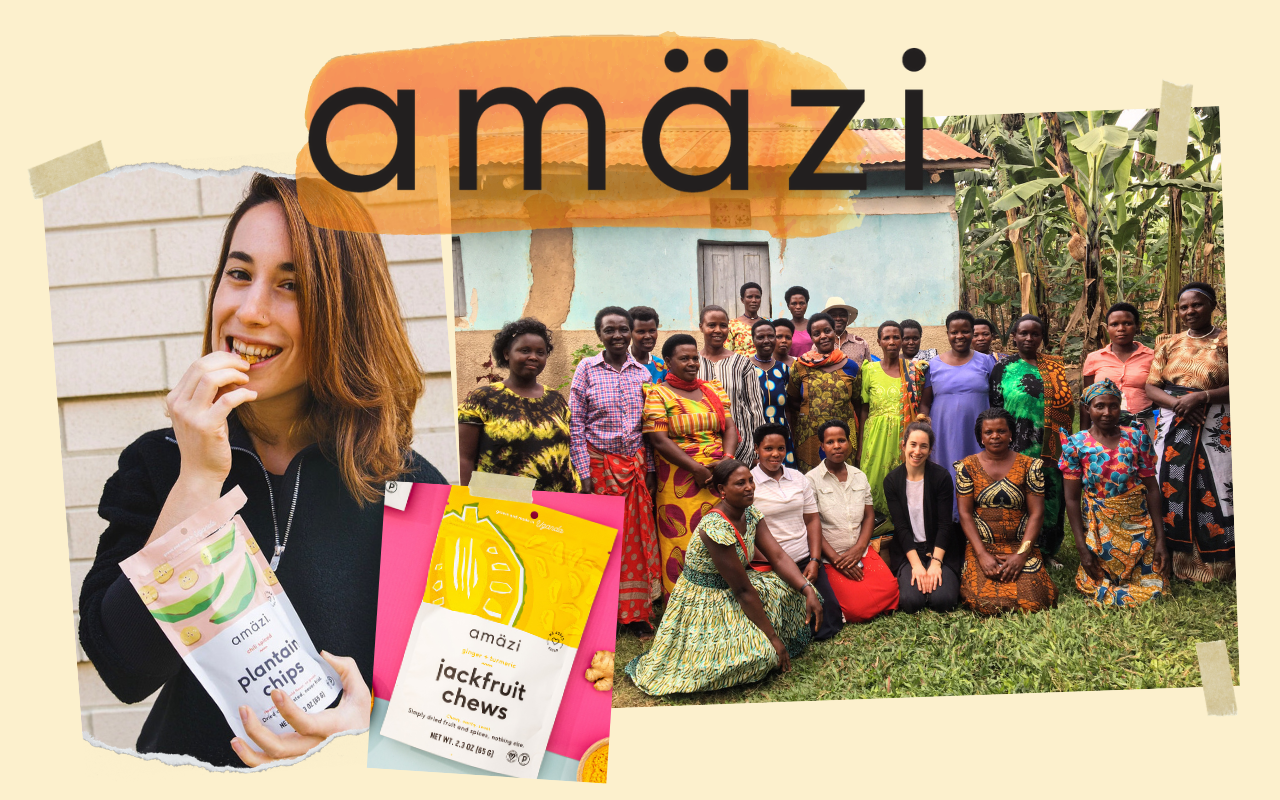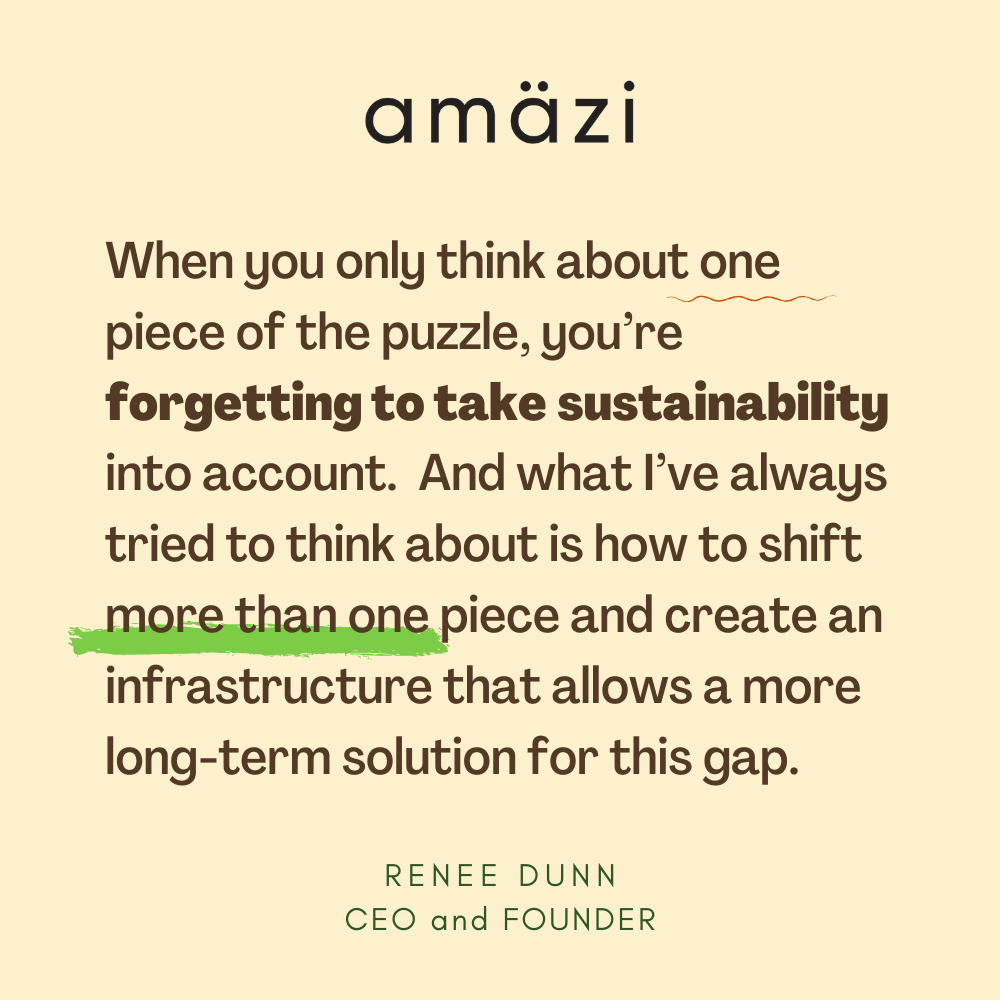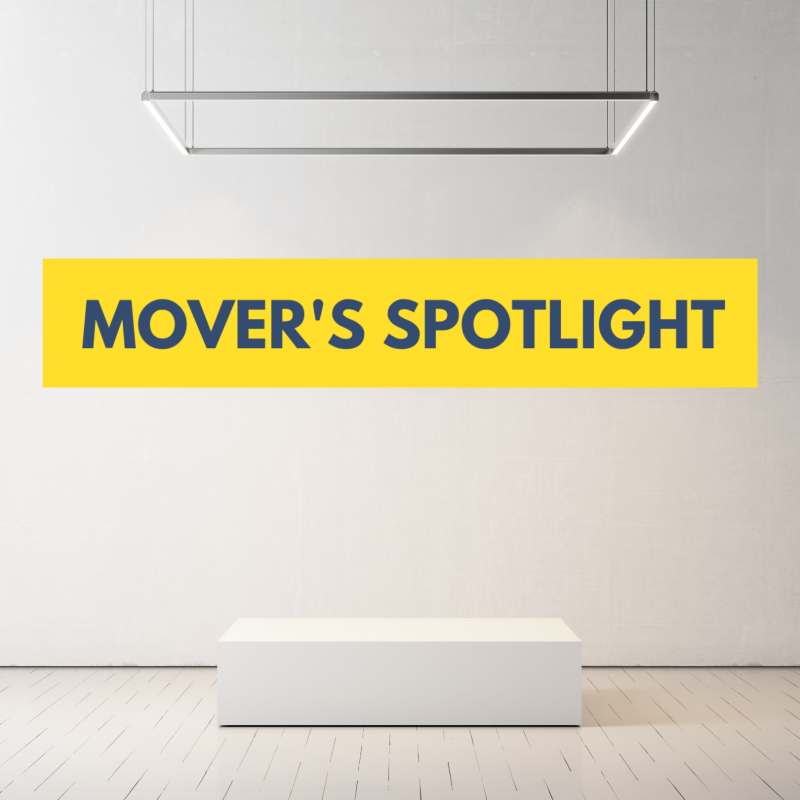
I’m excited to talk to you about Amazi and what you’re all about. But let’s start from the beginning. Renee Dunn, tell us what Amazi is and how it came to be.
Renee Dunn: So, Amazi is a mindful food company. We’re on a mission to help you Snack on Purpose with our 100% Made-in-Uganda snacks. Each of our products are really bold in their flavors and their textures, and really bold in their mission.
I started Amazi after living in Uganda and noticing two things.
- Their fruits are delicious. It was unlike anything I ever tasted in the US market. And it was in abundance and organically grown. So, I immediately thought how people in the US would love it.
- But then, I also noticed is that nobody locally was thinking about entering the US market that way. Everybody was used to participating only at the resource level. If you think about fair trade or ethical sourcing in a way that supports the farmers and their growth, they weren’t used to seeing opportunities beyond the farm level.
That type of business model essentially creates this big gap in our supply chain where people would grow the product and the fruits without ever really seeing the final item. They don’t get to see the innovation on the shelf, they don’t get to try new flavors, and they don’t get that market access.
So, I figured that we could come up with products that were a hundred percent made in Uganda, that supported local businesses and created local jobs, and allowed more value to stay in the Ugandan economy as opposed to shipping it out elsewhere to be created elsewhere. And that’s how Amazi came to be.
And from that international supply chain, you offer two main fruit flavors.
Renee Dunn: Yes! We have our Jackfruit Chews, which I basically like to describe as grown-up Fruit Rollups. They’re sticky, chewy and sweet. They’re made up of jackfruit and spices. We have our dried-never-fried plantain chips, which have a caramelized texture and very hardy crunch, sweet but without the greasy residue that you normally have with chips.
Your supply model is incredibly important to your brand story. Could you expound on your relationship with the farmers and the community in Uganda. Aside from farming, what other specific parts of your supply chain are based there?
Renee Dunn: We aim to have a very transparent and direct line from the farmers all the way to the time the snack gets into the bag. That entire process happens in Uganda.
We form relationships with farming communities, who work directly with our producers. We partner directly with a Ugandan-owned company to produce all our snacks. They receive the fresh items, wash the fruit, dry them, slice them, prepare our recipes, package them, and then ship them to us in the US totally ready for retail. The process is all entirely internal.
We’re also committed to transparency around the price structure. We know the market price for fruits in the region. And we ensure that the farmers get a premium price on the product and that the employees are always making two to three times the local wage. Keeping it all streamlined in the country allows us to build a better model for everybody involved.
Your FAQ page is refreshing and well thought-out. On it, you mention this concept of transitional farmers. Can you explain that a little bit?
Renee Dunn: Our goal is ultimately to gain an organic certification. We think that’s important and valuable. But the one thing that is hard with that is it can exclude farmers who are transitional. Transitional farmers grow their crops organically, but they have yet to go through certain processes and audit to get their full certification.
It can sometimes take up to 3 years to get their certification. And when a farmer’s livelihood depends on your purchase, they have very little reason to invest all the resources it takes to go through those audits when they’re not going to make a sale. You’re basically asking a farmer to trust in you, without them making a sale in 2-3 years.
For us, we work with smallholder farmers, not commercial farms. They’re not big entities who can wait. We have an organically-grown policy that indicates certain quality and quantity expectations of how they’re growing. But we will still purchase from those farmers who do not have their organic certification yet.
We’re currently working to get all of our farmers up to speed. There’s also the matter of funding. For a small business, it can get pretty expensive to certify all these farmers. But once we get the funding, we already have the relationship, the trust and the sales. It won’t be like us coming to the farmers and telling them to wait in order to be included.
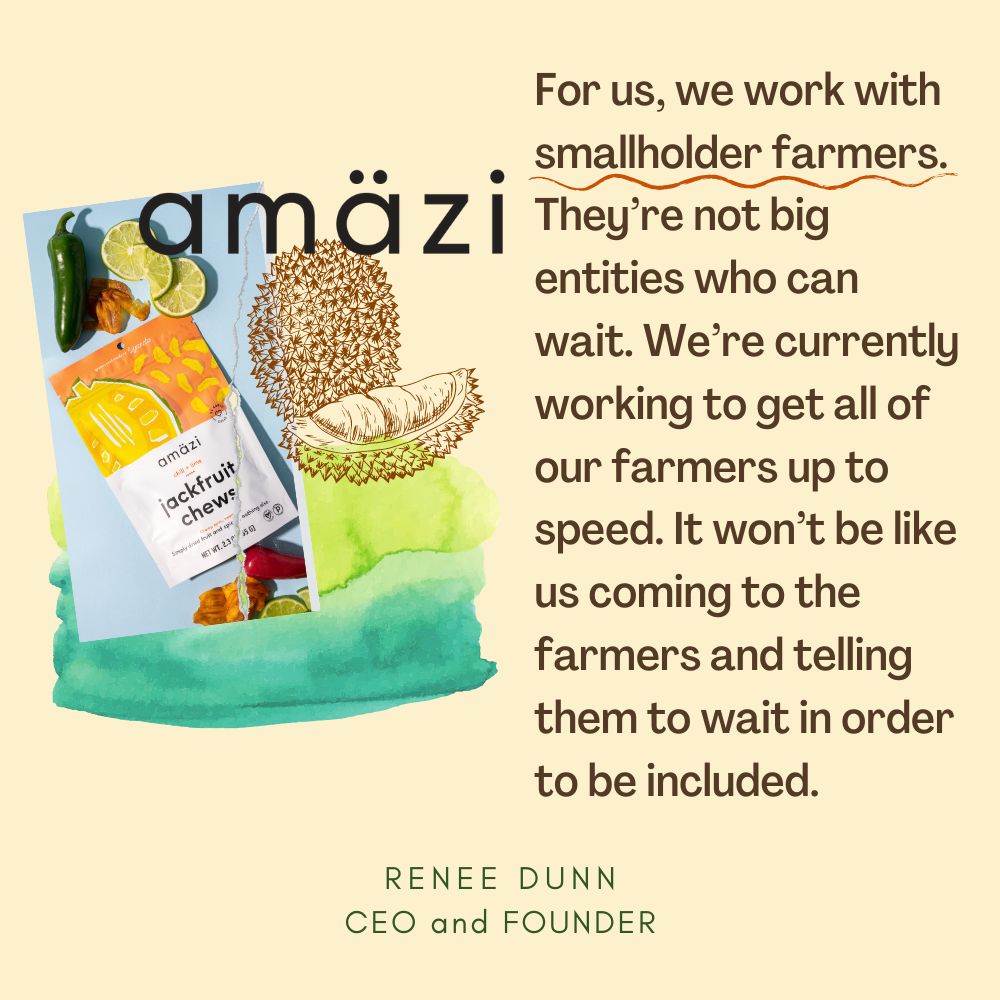
It’s impressive and inspiring, what you guys do. You’re making me think about sustainability as a process rather than an objective of getting a label. For you, what does sustainability mean?
Renee Dunn: Sustainability isn’t something you claim one time. You have to constantly work and see where things need to be improved. For example, right now, there’s a lot more that we could be doing from an environmental sustainability standpoint, and I even just had a call with our team in Uganda on improved composting practices. We’re aware of them. We could always be improving on it.
One thing we are doing a good job of is considering economic sustainability. I think it’s great that the fair trade model, for example, provides fair prices for farmers to reinvest in their farms.
But there’s the issue of pigeonholing these developing countries, or these resource-rich, countries into only being able to supply. We’re not supporting a sustainable local industry. One where people can have access to the output market and the equipment necessary to produce. Where they can add value by teaching people skills that aren’t there, and, ultimately, help them build their own business too, or develop their own product lines, or mobilize more farmers. Or whatever it might be.
So, I think when you only think about one piece of the puzzle, you’re forgetting to take sustainability into account. You might think, “I’m helping in this one step”, but how does that actually feed into the entire system? And what I’ve always tried to think about is how to shift more than one piece and create an infrastructure that allows a more long-term solution for this gap.
On wearegirlswhoeat, I read that you did your thesis on the state of entrepreneurship in Uganda. Are there insights that you gained from your work that you think small businesses in the States can learn from?
Renee Dunn: Yes, and no. I think one of the main points of my research was really to point out that entrepreneurship is affected by so many factors, in the political and economic spheres. It depends on the tax structure, it depends on the cultural relations, it depends on the social status, and the local tastes and the preferences and the access to the market.
And I think that we think about entrepreneurship in a very specific way. In the US, we think of the great entrepreneurs being Bezos and the people who created these mega companies.
In Uganda, the common entrepreneur is a “hustler” because the informal economy is much larger than the formal economy. They might have five small businesses at a time, they’re often seasonal and opportunistic because that’s how the local economy works.
But I think it’s really important to have both kinds of enterprise. Without the formal, large brands, you don’t have a lot of job creation and innovation happening, or additional industries emerging. But if you’re only hoping for these big grand ideas, there’s also a lot of missed opportunities in creating small improvements here and there.
Is that where you’re coming from, the desire not to miss out on opportunities to improve the way things are done?
Renee Dunn: I was coming at it from the point of view of policy around entrepreneurship. There are a lot of organizations that are trying to improve entrepreneurship in developing countries by promoting similar microenterprises. And that’s important for creating people’s personal livelihood. But I also don’t think it creates opportunities for the other kinds of entrepreneurship.
So, I think, basically, if I were to have a lesson, it’s important, in your community or your city, to think about the scope of creating something beyond yourself. And are you even trying to create something beyond yourself? Some people just want to be self-employed. For some people, they are their business.
But if you’re thinking about building an enterprise outside of yourself, that’s going to look very different.
I kind of joke with people that we’re masquerading as a snacks company, and that we have to play in the snacks spaces. But, in the end, we’re really a social enterprise. For me, the supply chain and the idea came before the product.
When you’re looking at marketing or branding your product, how do you communicate these principles of sustainability? Do they shape how you brand or market Amazi?
Renee Dunn: That’s a great question. I don’t know if I have the full answer yet. We’re still learning how to really communicate what we do to the customer.
One thing that I’ve learned is that with a product, especially a food item, you don’t necessarily pull something off the shelf because it tells a good story. You have to make it accessible, relatable, vibrant and exciting. You have to show people how this product can be useful for them, and then let them know the story. After all, it can be kind of pretentious to put this all out to somebody right off the bat. It’s best for us to lead people in with excitement about the product then we have an opportunity to get them more curious.
We do little things like putting our slogan “Snack on Purpose” on the bag. We’re getting better at visually telling our story. We’re doing a new round of packaging where on the back we show farmers and processing partners in a visual way that helps people understand much more quickly.
We try to be really transparent about the business process. On our Instagram, on our newsletters, on our blogs, I would often do a ‘behind the scenes’ look at what we do. We’ve even done some IG TV episodes where we interview the production managers in Uganda.
It’s these little things I think that will give it more authenticity than just putting “transparent’ and “sustainable” on the packaging. The more that we show people our values, and allow them to truly enjoy the product, the more they’ll buy into the mission overtime.
What was 2020 like for you? Running an international supply chain, did you run into any problems with all the lockdowns and quarantine measures?
Renee Dunn: Yes, we had a lot of issues (laughs). It was a challenging year. And I think we’re only going to continue to see the effects on the industry.
Personally, it’s the longest I’ve ever been without going to Uganda. It’s been almost a year. I used to go there two or three times a year. So, for me, it was really hard. I like to talk about this connected supply chain, but last year I felt really disconnected. But I am grateful that right before COVID hit, we were able to set up a new factory for our suppliers. They’ve been able to handle this year without us being there. If that relationship had not been in place, we would not be in business still.
On Amazi’s overall growth:
In the beginning, we were really affected. We’re a new brand to shelves and we encountered a lot of issues in the retail channel. Distributors were not taking up our items because we’re a relatively new brand and we weren’t essential. Some new stores were unaware that our products were supposed to be there. Conversations with new retailers also slowed down because they were overwhelmed with the duty of making their stores COVID-safe. Ultimately, we had to move away from efforts in the retail channel for several months. We were still selling, but we were not growing in the way that we had projected.
On inventory troubles:
And, as a result, we ran into a lot of inventory issues where we were expecting to sell through a certain amount but that wasn’t happening.
Because of our supply chain, we have to produce a lot in advance, and then ship it. It takes time to get from Uganda to here. We can’t, like most small businesses, produce according to a purchase order where they make it then they sell it. For us, we have to buy inventory upfront and sell it as we have sales. So, we ran into the problem where we were spending a lot of money on inventory, but retail sales were going down. We had to start getting creative about getting our products out there.
Another big challenge was international freight. Freight has gotten expensive and it has gotten very competitive. It’s very hard to get a container for your product.
On creative solutions:
We were able to find a few great new channels. One of them was Misfits Markets, a delivery-grocery service that short-dated items or produce that doesn’t make it to grocery shelves. They’re a great way to sell inventory that have less than a six-month shelf life, but are still perfectly great to eat.
We also started doing a lot more online snackboxes and corporate gifting. Businesses in our shoes have had to really think about an omnichannel approach to reach people. We used to sell on college campuses and offices. With people working from home, corporate gifting proved to be a great way for us to reach people in their office at home. We’ve done it on a lot of different platforms and it was really successful.
So, we’ve ran into a lot of challenges, but I’m grateful that, for the most part, production has been able to continue. We’ve had to deal with longer lead times, but I think, and hopefully, the worst is over. And that retail is starting to move again.
At the same time, are there aspects of your business or ways that you do business that you’re leaving behind in 2020?
Renee Dunn: Definitely. We’ve gotten rid of some of the expenses we had before. We parted ways with some contractors because we felt that there was an opportunity for us to learn how to do things ourselves and save some money along the way.
But we also added new things like I, personally, as CEO started to take our cash flow more seriously. I started to do weekly and monthly cash flow projections. In the past, I never really did that. COVID was really a teaching moment to be more efficient with capital.
On our website, it used to say that you could order one bag, three bags, two bags – but we changed it so that everything comes in six bags. You can still buy variety packs. But the new model allows us to partner with a non-profit that employs intellectually disabled people who pre-kit the items and help us ship them out. And, of course, it has allowed us to make our process more efficient.

Do you eventually plan to add more flavors and fruits?
Renee Dunn: I don’t know if we’ll be able to add them this year. I don’t know when I’ll be able to return to Uganda. Perhaps, at the end of the year, when there are more vaccines. My goal by 2022 is to introduce new products. We want to bring back our papaya strips. But we also plan on doing some new and exciting fruit blends, and offer some additional variations on our plantain products too.
We do have a lot of ideas in the works. We’ll probably release one thing at a time. After all, we’re just a very small company. You can’t just do everything at once. I do hope that by 2022, we’ll have new items to share with everybody.
Aside from adding new fruits, what are you looking forward to the most this year?
Renee Dunn: I think this is going to be a big year for Amazi. We have a lot of exciting meetings in the next couple of months. We’re rolling out to some dream retailers. Ultimately, I’m just excited that we’re able to reach new people on the shelf with our products. I’m also excited to finally work towards getting our Ugandan Partners working to their full capacity so that they can employ more people, more regularly.
The more we grow, the more people buy our products, the more stores we get, the more we make our business more optimal for our partners and farmers in Uganda. I’m looking forward to getting that to a good place by the end of the year.
